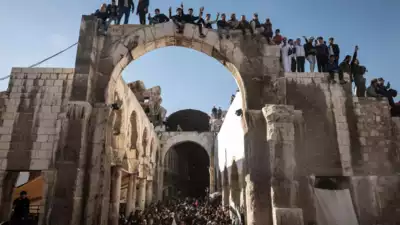DAMASCUS: Syria’s new authorities announced on Tuesday that the military chief of the Islamist group that spearheaded the offensive that toppled longtime ruler Bashar al-Assad had been appointed defence minister in the transitional government.
“The General Command announces the nomination of General Murhaf Abu Qasra as defence minister in the new government of the Syrian Arab Republic,” said a statement carried by the official news agency SANA.
Abu Qasra, 41, a former agronomist, led the armed wing of Hayat Tahrir al-Sham (HTS) for five years.
As commander of the Islamist rebel forces, he played a key role in the offensive that ousted Assad on December 8 after a lightning advance from north Syria to the capital Damascus.
On Sunday, Abu Qasra was given the rank of general in a decree from HTS chief Ahmed al-Sharaa, now Syria’s de facto leader.
Some other key positions in the transitional government, headed by Mohammad al-Bashir, have already been filled.
Bashir, who led the rebels’ self-proclaimed “Salvation Government” in their northwestern Idlib bastion, was made interim prime minister until March 1.
In an interview with AFP on December 17, Abu Qasra used his real name for the first time after years of going by his nom de guerre Abu Hassan al-Hamawi, which referenced his native Hama region in central Syria.
He said in the interview that HTS would be “the first” to dissolve its armed wing and integrate into the national forces, demanding that other groups do the same.
Abu Qasra also said that the new leadership would seek to extend its authority to semi-autonomous, Kurdish-held areas in Syria’s north and northwest.
In the interview, Abu Qasra called on the international community to “find a solution” to repeated Israeli strikes and an “incursion” into Syrian territory in the wake of Assad’s fall.
Leader Sharaa has also criticised Israel’s military action, which he said “threatens a new unjustified escalation in the region”.
But he noted that “the general exhaustion in Syria after years of war and conflict does not allow us to enter new conflicts.”




